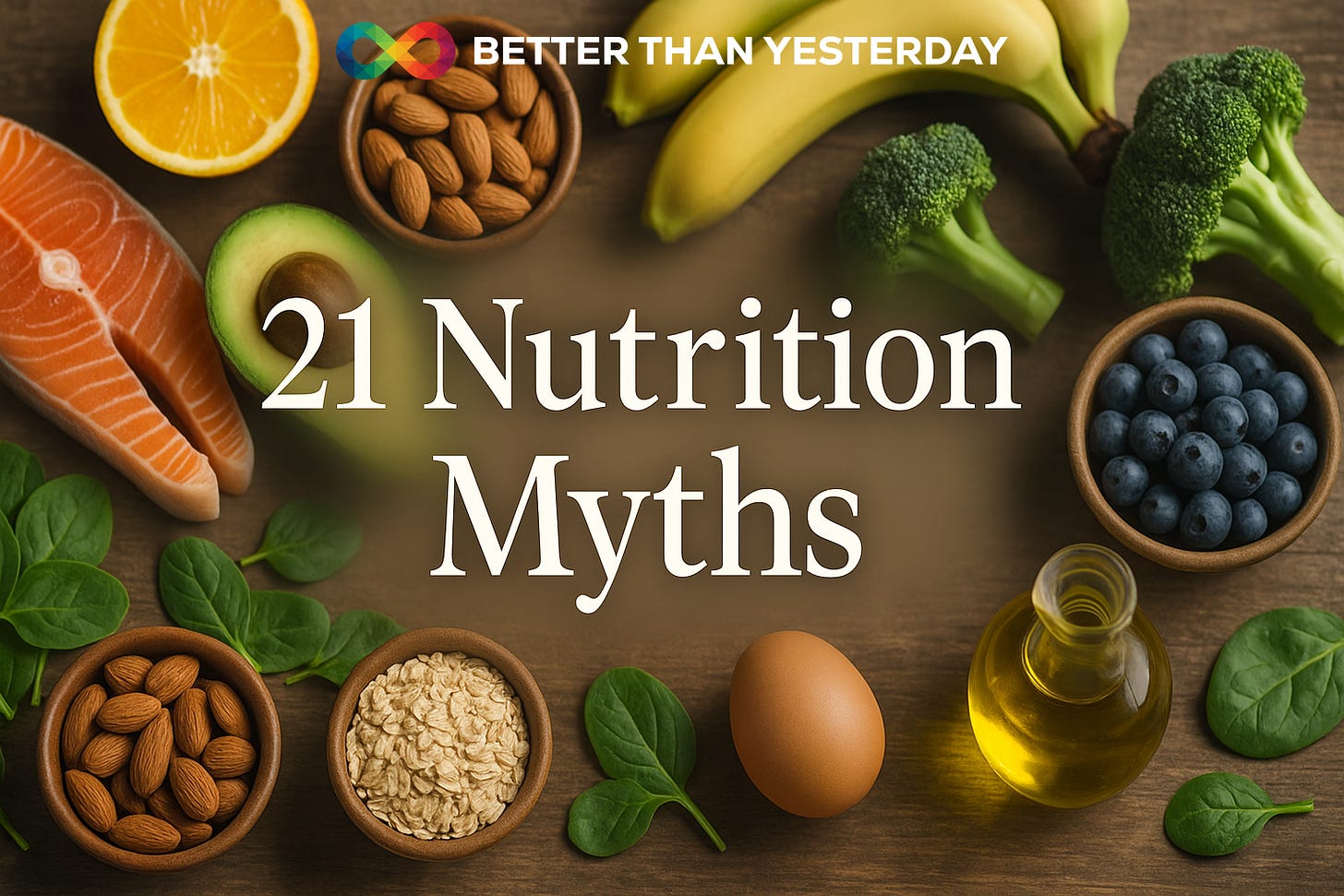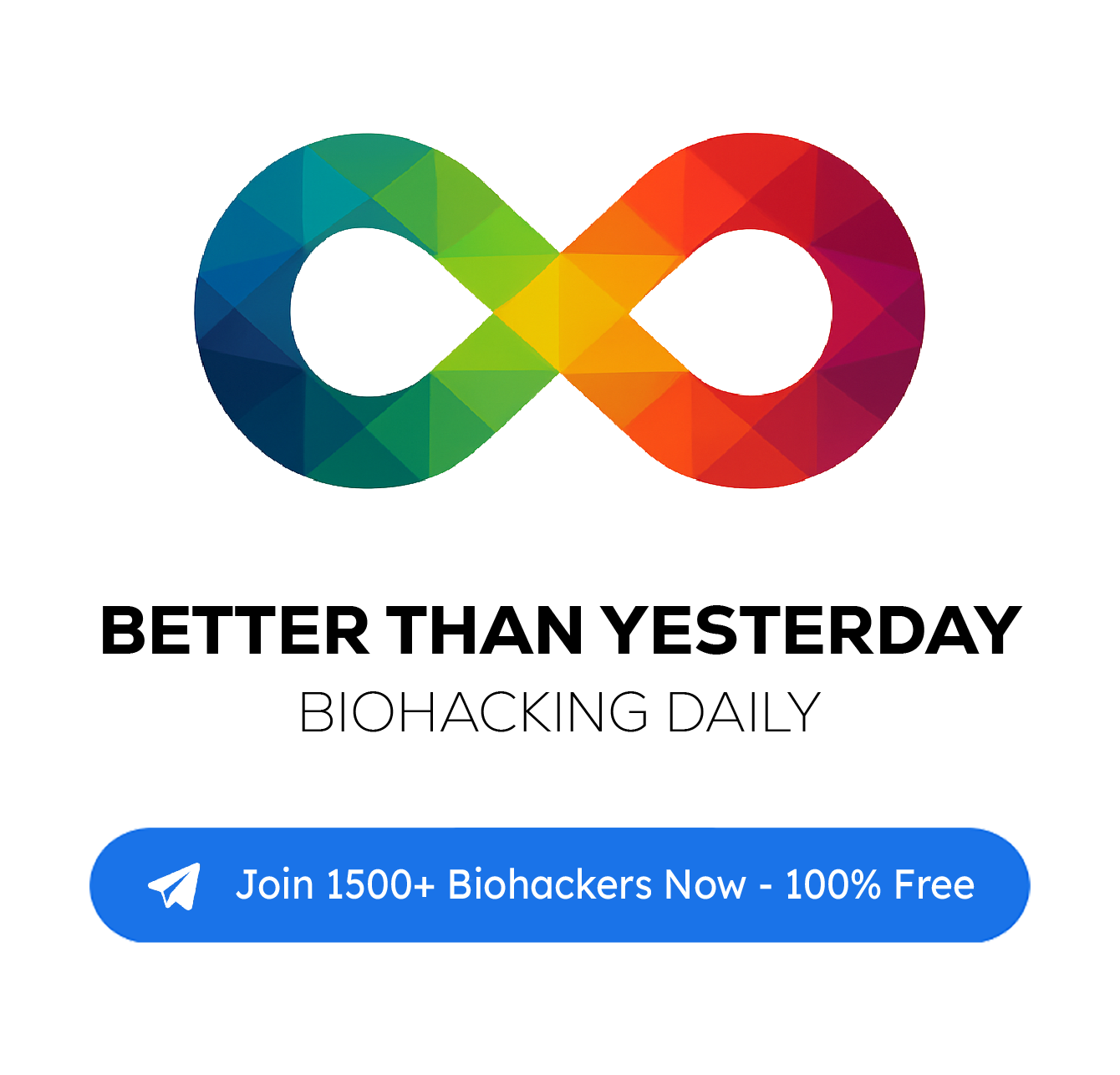21 Nutrition Myths Debunked
Biohacker’s guide to spotting nutrition myths before they mess with your health.
We live in a world with endless information at our fingertips. Yet somehow, nutrition myths are more alive today than ever. From social media trends to clickbait headlines, the noise keeps growing.
Most people don’t have the time to read through the original research. So bad ideas stick around and get passed off as “facts.”
That’s why I want to share something from Examine.com, a site I trust because it’s completely independent. No supplement companies, no marketing, no AI, just a team that reviews human studies and explains them in plain English. For biohackers like us, it’s gold.
🍽️ The 21 Biggest Nutrition Myths
🧪 Protein damages bones and kidneys
The claim is that eating too much protein weakens bones and stresses kidneys. The reality is the opposite. Protein helps calcium absorption and supports bone health, and it does not damage kidneys in healthy people.
🍚 Carbs make you fat
Carbs are not the reason for fat gain. Eating more calories than you burn is. Low carb and higher carb diets both work when calories and protein are controlled.
🧈 Fat is always bad
Not all fats are the same. Trans fats are clearly harmful, but saturated fats depend on context and what you replace them with. Overall diet quality matters more than cutting out all fat.
🥚 Eggs raise your cholesterol dangerously
Eggs are packed with nutrients and safe for most people. They do not increase cardiovascular risk in the general population. Only a small group of people respond strongly with cholesterol changes.
🥩 Red meat causes cancer
Processed and charred meats are the main issue. Moderate amounts of fresh red meat, combined with a balanced diet and exercise, are unlikely to cause harm.
🧂 All salt is bad
Too much salt can raise blood pressure, but very low intake can also be harmful. Balance is important, and eating more potassium-rich whole foods matters more than cutting all salt.
🍞 Bread makes you fat
Bread does not make you fat unless it adds excess calories. Gluten is only a real problem for people with celiac disease, sensitivities, or IBS triggers.
🧃 High fructose corn syrup is worse than sugar
HFCS and sugar are almost identical in composition. Both are problematic only when consumed in excess.
💊 Everyone needs supplements
Supplements can help in specific situations like vitamin D deficiency or vegan diets lacking B12. But they are not required for everyone if you eat a balanced diet.
🥄 Food is always better than supplements
Whole foods are usually best, but sometimes supplements absorb better. Examples include curcumin and certain forms of folate.
🧊 Frozen produce is less healthy
Frozen fruits and vegetables often keep as many nutrients as fresh ones because they are frozen quickly after harvest. Canned produce can vary in quality.
🌿 “Natural” means healthy
The word natural on packaging is not regulated and does not guarantee health benefits. Many natural products can still be unhealthy.
🧽 Detox diets cleanse your body
Your body already has a detox system through the liver, kidneys, and lungs. Juice cleanses and detox teas do not remove toxins.
⏰ Eating more often boosts metabolism
More frequent meals do not speed up metabolism. The important factor is your total calories and protein across the day.
🥣 Skipping breakfast is unhealthy
Breakfast is not essential for everyone. Some people perform better with it, others without. It depends on personal preference and health needs.
🌙 Eating late at night makes you fat
Eating late does not automatically cause fat gain. It only becomes a problem if it leads to excess calories.
🚶 Fasted cardio burns more fat
Fasted cardio burns more fat during the workout but overall fat loss is the same as fed cardio. Consistency matters most.
🥤 You need protein right after training
Protein after training is useful, but the total protein you eat across the whole day is what really matters. The anabolic window is larger than people think.
⚗️ Creatine is dangerous
Creatine is one of the most studied supplements. It is safe, effective, and does not harm the kidneys in healthy people.
🥬 Negative calorie foods exist
Foods like celery do not burn more calories than they provide. They are simply low in calories, high in fiber, and good for fullness.
At the end of the day, nutrition is less about single foods or magic rules and more about long term patterns. Balance, variety, and sustainability always win.



